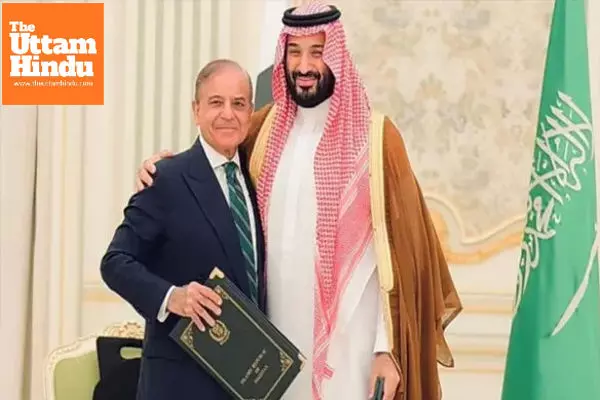
On September 17, Pakistan and Saudi Arabia signed a strategic mutual defense agreement. A key feature of the pact is that an attack on either country will be considered an attack on both. Analysts suggest that regional security risks in the Gulf and perceived threats from Israel motivated Saudi Arabia, while Pakistan’s strategic calculations have historically been India-centric. Following Operation Sindoor, Pakistan has been recalibrating its international strategy, and this agreement appears to be part of that plan.
The roots of Pakistan-Saudi relations are deep and longstanding. Saudi support for Pakistan began even before its creation. In 1946, Prince Faisal advocated for the Muslim League’s Pakistan project at the United Nations. Saudi Arabia was among the first countries to recognize Pakistan as a sovereign nation. During the 1960s, Prince Sultan called Pakistan “our closest friend” and emphasized reliance on it for military support.
Israel has also been a factor in the bilateral strategic relationship. The first formal defense agreement between the two nations was signed in 1967, during which Pakistani military advisors assisted in the expansion and modernization of Saudi armed forces. On Kashmir, Saudi Arabia historically supported Pakistan diplomatically. In the 1965 war, Saudi Arabia provided Pakistan with various supplies, diplomatic cover, and support. During the 1971 war and the Bangladesh crisis, Saudi diplomats criticized India at the UN while backing Pakistan. Even after Bangladesh’s creation, Saudi Arabia hesitated to recognize it and awaited Pakistan’s stance.
However, during India’s abrogation of Article 370, Saudi Arabia maintained a relatively neutral position, influenced partly by India’s growing economic stature, which Saudi Arabia seeks to benefit from. The financial assistance Saudi Arabia provides to a struggling Pakistan offers significant relief, while also enhancing Pakistan’s influence in the Muslim geopolitical framework. For Saudi Arabia, the agreement strengthens its strategic shield against Iran and Israel, whereas Pakistan seeks to counter India’s growing power and influence.
This development raises the possibility that in any future conflict involving Pakistan, India may need to remain vigilant about the potential role of Gulf countries. India’s official response to the agreement has been measured, emphasizing that it hopes Saudi Arabia will respect India’s sensitivities, and reiterating that national interest and security remain India’s priority.
Pakistan, since its inception, has consistently opposed India. Saudi Arabia historically assisted Pakistan even before its formation. However, changing international circumstances have strengthened India-Saudi ties today. While the concept of the Muslim brotherhood exists, Saudi Arabia is expected to prioritize Pakistan over India in certain matters, as it has in the past.
Amid rising internal chaos and a weakening economy, Pakistan has recently signed agreements with Russia, China, the United States, and Bangladesh. Analysts view these as attempts to apply psychological pressure on India. India must remain alert and formulate strategies to counter such moves. The adjustments in Pakistan’s international strategy following Operation Sindoor indicate an effort to increase pressure on India internationally while diverting domestic attention from internal unrest and economic issues. The most effective response to the Pakistan-Saudi agreement lies in a strong India—militarily, economically, and politically.
